Standard Bank Group Bundle
How Does Standard Bank Group Thrive in Africa's Financial Landscape?
Standard Bank Group, a leading Banking Company in South Africa, stands as a financial powerhouse with deep roots in the African continent. Boasting a history stretching back to 1862, SBG has evolved into a pan-African institution with a global presence. With impressive financials and a strategic focus on growth, understanding Standard Bank's operations is key to navigating the complexities of African markets.
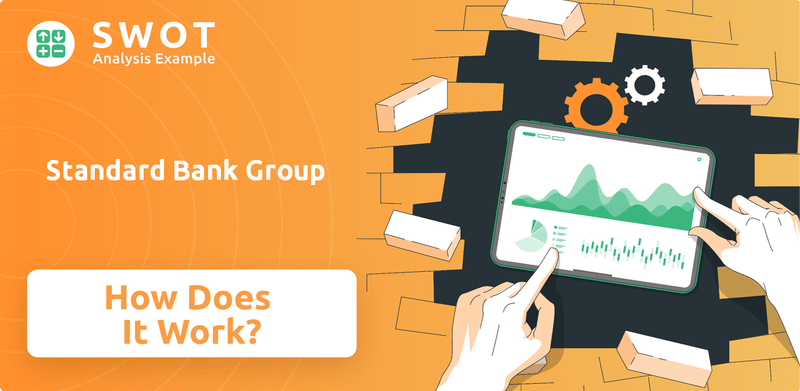
This exploration into Standard Bank Group will dissect its core operations, from its diverse revenue streams to its strategic positioning across 20 sub-Saharan African countries. For those seeking a deeper understanding, this analysis will also touch upon Standard Bank Group SWOT Analysis, providing valuable insights into its strengths, weaknesses, opportunities, and threats. Whether you're an investor, a business strategist, or simply curious about the future of Financial Services in Africa, this is a must-read.
What Are the Key Operations Driving Standard Bank Group’s Success?
The core operations of Standard Bank Group (SBG) revolve around delivering a comprehensive suite of financial solutions. These solutions cater to a diverse clientele, including individuals, small to medium-sized enterprises (SMEs), large corporations, and various governmental and financial institutions. The group's value proposition lies in its ability to provide integrated services across multiple sectors, leveraging its extensive network and expertise.
Standard Bank structures its offerings primarily through three main business units: Personal and Business Banking (PBB), Corporate and Investment Banking (CIB), and Wealth Management and Insurance. This structure allows the group to provide specialized services tailored to different client needs, from everyday banking to complex financial transactions and wealth management.
The group's commitment to digital transformation and its pan-African footprint are key differentiators. SBG invests heavily in technology to streamline services and enhance customer experience, while its extensive presence across the African continent provides geographic diversification and access to faster-growing markets. This strategic approach enables Standard Bank to maintain a competitive edge in the financial services industry.
PBB offers transactional banking, savings, borrowing, and lending services. It supports the everyday financial needs of individuals and the growth of SMEs. This unit focuses on providing accessible and efficient banking solutions to a broad customer base.
CIB provides sophisticated corporate and investment banking services. It facilitates large-scale transactions, project financing, and advisory services for governments, corporations, and financial institutions. This unit caters to the complex financial needs of larger entities.
This unit offers insurance products, asset management, and wealth advisory services. Bolstered by the full acquisition of Liberty in 2022, it aims to protect and grow clients' assets. This segment focuses on providing comprehensive wealth management solutions.
SBG invests heavily in technology to streamline services and enhance customer experience. In 2024, the group spent R22.4 billion on IT, a 2% increase from 2023. This investment has led to significant growth in digitally active clients.
Standard Bank's operational success is underpinned by its strategic investments and extensive reach. The group's focus on digital transformation and its pan-African presence are key drivers of its value proposition.
- Digital Banking: 64% of transactional clients in PBB South Africa are digitally active.
- Digital Enablement: 84% of business transactional clients are digitally enabled.
- Mobile App Usage: Over 130 million mobile app logins per month from retail clients.
- Geographic Footprint: Approximately 1,200 branches and points of representation and 5,500 ATMs across the African continent.
Standard Bank Group SWOT Analysis
- Complete SWOT Breakdown
- Fully Customizable
- Editable in Excel & Word
- Professional Formatting
- Investor-Ready Format
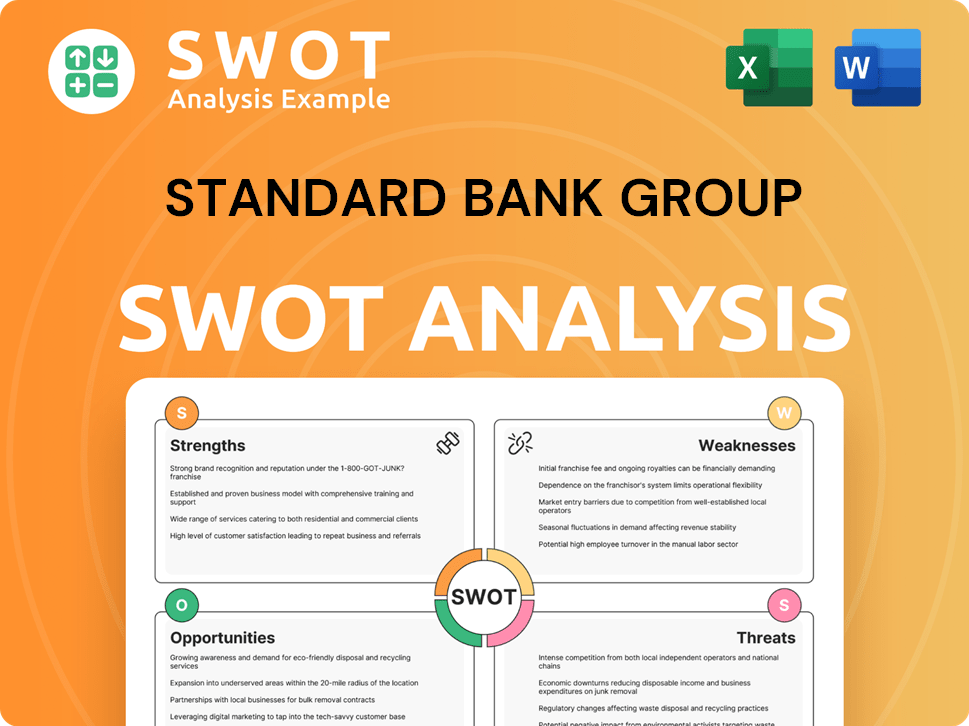
How Does Standard Bank Group Make Money?
The Standard Bank Group (SBG) generates revenue through a diverse range of financial services. Its primary income streams include net interest income, non-interest revenue, and contributions from its insurance and asset management businesses. In 2024, the group reported a total net income of R181.7 billion, showcasing its strong financial performance.
Net interest income (NII) is a key revenue driver for Standard Bank. This income reflects the difference between interest earned on loans and investments and the interest paid on deposits. Non-interest revenue, including fees, commissions, and trading activities, also significantly contributes to the group's overall earnings. The company's strategic focus on digital revenue and sustainable finance further enhances its monetization strategies.
The group's monetization strategies involve a focus on digital revenue, with digital revenue from retail clients in South Africa growing by 36% in 2024. Furthermore, the group actively participates in sustainable finance initiatives, mobilizing over R21 billion in sustainable finance in the first half of 2024, with a target to mobilize over R450 billion by 2028. This approach not only boosts revenue but also aligns with global sustainability trends.
The revenue streams of Standard Bank are multifaceted, ensuring financial stability and growth. The following points highlight the key areas:
- Net Interest Income (NII): This is the difference between interest earned on loans and investments and interest paid on deposits. In the first half of 2024, NII increased by 7%, supported by growth in advances and deposits. The net interest margin improved by 10 basis points to 497 basis points.
- Non-Interest Revenue: This includes net fee and commission revenue and trading revenue. Net fee and commission revenue increased by 4% to R15 billion in the first half of 2024, driven by card-based commissions and electronic banking fees. Trading revenue saw fluctuations, with a decrease in the first half of 2024, but an increase in the second half.
- Insurance and Asset Management: This segment delivered a robust performance, with headline earnings growing by 17% to R3.3 billion in 2024. Assets under administration and management in the South African asset management business increased by 13% to R1.1 trillion.
- Digital Revenue: A significant focus area, with digital revenue from retail clients in South Africa growing by 36% in 2024.
- Sustainable Finance: Mobilized over R21 billion in sustainable finance in the first half of 2024, with a target to mobilize over R450 billion by 2028. This is a key part of the Marketing Strategy of Standard Bank Group.
Standard Bank Group PESTLE Analysis
- Covers All 6 PESTLE Categories
- No Research Needed – Save Hours of Work
- Built by Experts, Trusted by Consultants
- Instant Download, Ready to Use
- 100% Editable, Fully Customizable
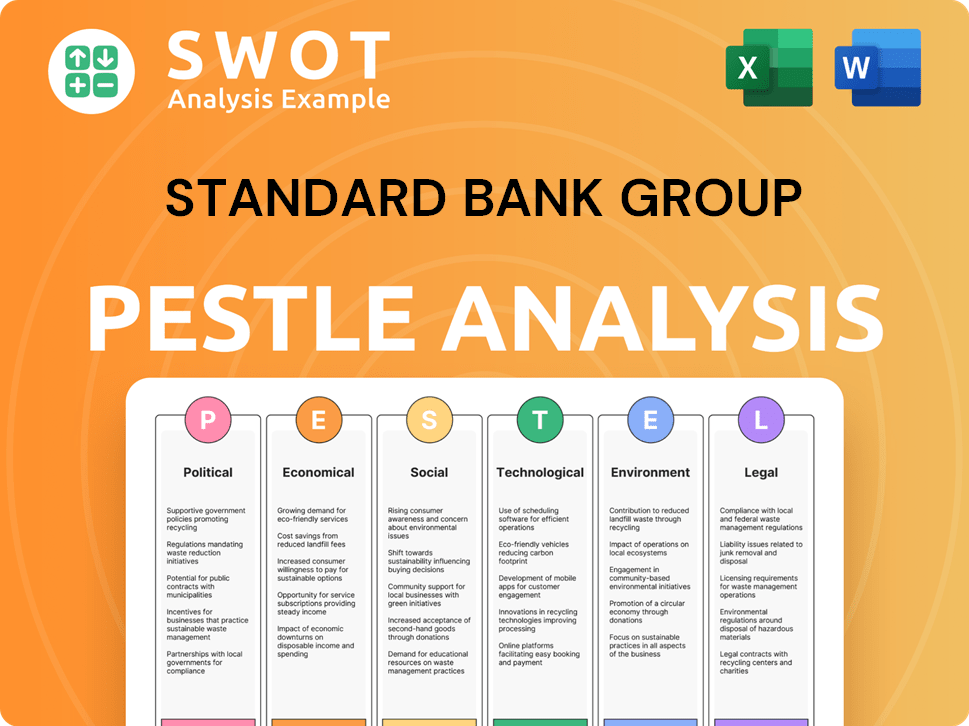
Which Strategic Decisions Have Shaped Standard Bank Group’s Business Model?
The Growth Strategy of Standard Bank Group has been marked by significant milestones, strategic initiatives, and a focus on maintaining a competitive edge in the financial services sector. These elements are crucial to understanding its operational dynamics and market positioning. The company's actions and performance reflect its adaptability and commitment to growth, even amidst challenging economic conditions.
One of the key strategic moves for the SBG was the full acquisition and integration of Liberty in 2022, which strengthened its insurance and asset management business. This integration has played a role in robust earnings growth within this segment. The consistent investment in technology is another crucial strategic move, with R22.4 billion spent on IT in 2024 to enhance digital platforms, improve operational efficiency, and drive client engagement.
The company has faced operational and market challenges, including global economic uncertainty, elevated inflation, and rising interest rates in 2023. In South Africa, electricity disruptions and logistics constraints also pressured businesses. Standard Bank responded by maintaining strong balance sheet growth, managing credit impairment charges, and controlling costs. The South African franchise delivered double-digit earnings growth in 2024, supported by increased client activity and improving credit trends, and the formation of the Government of National Unity in South Africa boosted consumer and business confidence.
The full acquisition of Liberty in 2022 was a pivotal milestone, consolidating its property portfolio and enhancing its insurance and asset management capabilities. This strategic move has been instrumental in driving earnings growth. Another key milestone is the ongoing investment in technology, with R22.4 billion allocated in 2024 to improve digital platforms and operational efficiency.
The investment in technology is a core strategic move, aimed at enhancing digital platforms and operational efficiency. The focus on sustainable finance, including a commitment to mobilize R450 billion for energy and infrastructure development by 2028, is another significant strategic direction. Maintaining a strong balance sheet and managing credit impairment charges are also key strategies.
Its extensive pan-African footprint across 20 sub-Saharan African countries provides an unrivalled on-the-ground presence and deep expertise. The group's strong brand, recognized as Africa's Most Valuable Banking Brand for the third consecutive year in 2024, further enhances its competitive edge. Superior risk management, reflected in significantly fewer trading loss days compared to peers, also contributes to sustained growth.
The South African franchise delivered double-digit earnings growth in 2024, supported by increased client activity and improving credit trends. The investment in technology led to a 6% increase in digitally active retail clients in South Africa in 2024. The group's commitment to sustainable finance includes mobilizing R450 billion for energy and infrastructure development by 2028.
The SB Group's competitive advantages are multifaceted, stemming from its extensive pan-African presence and strong brand recognition. Its focus on digital transformation and sustainable finance further strengthens its market position. The bank's ability to adapt to new trends and technologies contributes to its sustained growth and resilience.
- Extensive Pan-African Footprint: Presence in 20 sub-Saharan African countries.
- Strong Brand Recognition: Africa's Most Valuable Banking Brand for the third consecutive year in 2024.
- Superior Risk Management: Fewer trading loss days compared to peers.
- Digital Transformation: Prioritizing digital platforms and client engagement.
- Sustainable Finance: Mobilizing R450 billion for energy and infrastructure by 2028.
Standard Bank Group Business Model Canvas
- Complete 9-Block Business Model Canvas
- Effortlessly Communicate Your Business Strategy
- Investor-Ready BMC Format
- 100% Editable and Customizable
- Clear and Structured Layout
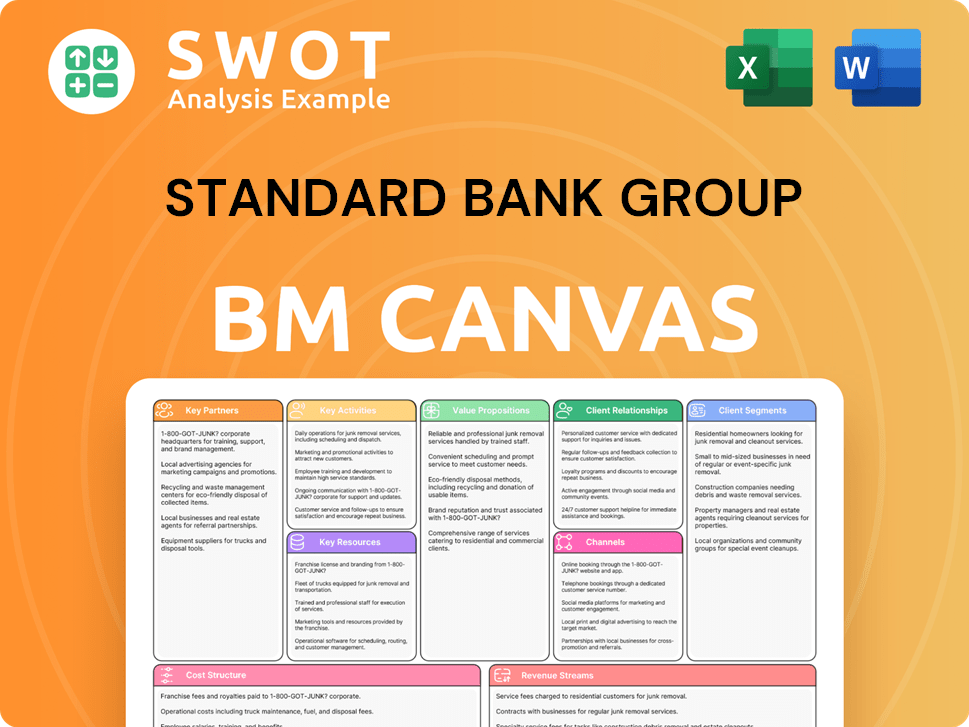
How Is Standard Bank Group Positioning Itself for Continued Success?
Standard Bank Group (SBG) is a leading financial services provider in Africa, holding the title of the continent's largest bank by assets. As of December 31, 2024, the group's market capitalization was approximately R368 billion (around USD 19.6 billion), positioning it among the world's largest companies. The Banking Company operates across 20 sub-Saharan African countries and global financial centers, demonstrating a broad reach and strong customer base.
SBG's extensive presence has fostered considerable customer loyalty, with active clients reaching 20 million in 2024, reflecting a 4% increase. The Africa Regions segment significantly contributes to its financial performance, accounting for 41% of the group's headline earnings in FY24. This highlights the crucial role of its African operations in its overall financial success. To learn more about the group's strategic direction, read the Growth Strategy of Standard Bank Group.
SBG faces several risks, including global economic uncertainties and geopolitical tensions. Elevated inflation and varying interest rate outlooks across different regions pose challenges. Currency fluctuations, particularly the weakening of local currencies in West Africa, can impact earnings. Climate change also presents financial and operational risks that the group must manage.
SBG is focused on achieving its 2025 strategy targets, aiming for a return on equity (ROE) between 17% and 20%. The group has set new medium-term targets (2026-2028), including headline earnings per share growth of 8%-12% and an expanded ROE target of 18%-22%. Key strategic initiatives include leading Africa's energy and infrastructure development and maximizing portfolio value.
SBG plans to sustain and expand profitability through digital transformation and supporting economic growth. The group is committed to mobilizing sustainable finance, targeting R450 billion by 2028. SBG's strong capital position will be leveraged to fund growth opportunities across Africa, driving long-term value.
- Digital transformation to enhance customer experience.
- Sustainable finance mobilization to support economic growth.
- Capital allocation to fund growth opportunities.
- Focus on leading Africa's energy and infrastructure development.
Standard Bank Group Porter's Five Forces Analysis
- Covers All 5 Competitive Forces in Detail
- Structured for Consultants, Students, and Founders
- 100% Editable in Microsoft Word & Excel
- Instant Digital Download – Use Immediately
- Compatible with Mac & PC – Fully Unlocked
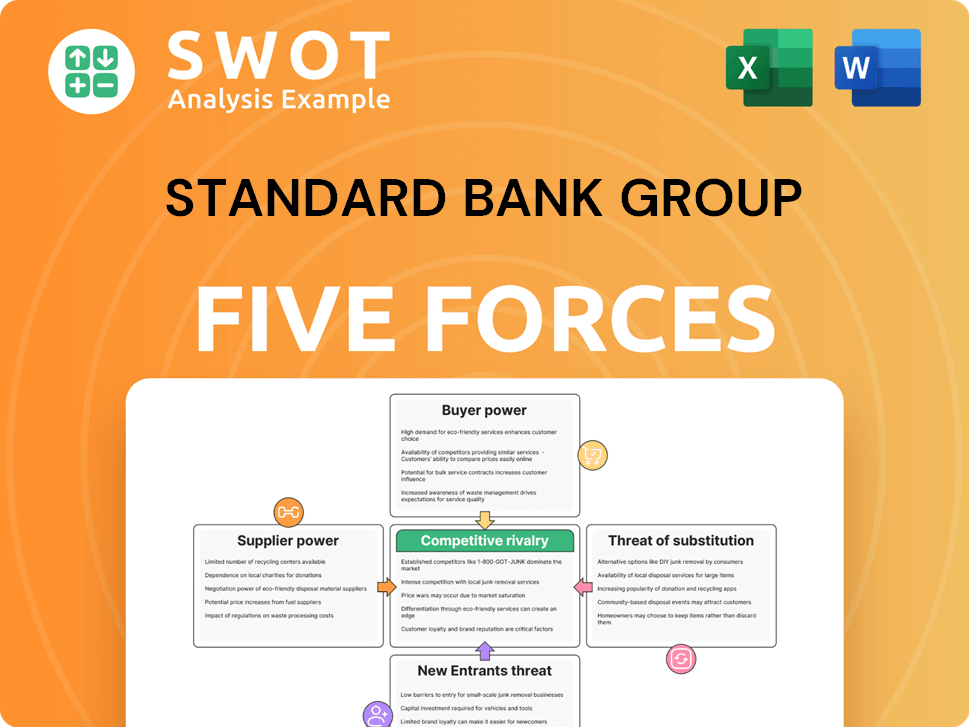
Related Blogs
- What are Mission Vision & Core Values of Standard Bank Group Company?
- What is Competitive Landscape of Standard Bank Group Company?
- What is Growth Strategy and Future Prospects of Standard Bank Group Company?
- What is Sales and Marketing Strategy of Standard Bank Group Company?
- What is Brief History of Standard Bank Group Company?
- Who Owns Standard Bank Group Company?
- What is Customer Demographics and Target Market of Standard Bank Group Company?
Disclaimer
All information, articles, and product details provided on this website are for general informational and educational purposes only. We do not claim any ownership over, nor do we intend to infringe upon, any trademarks, copyrights, logos, brand names, or other intellectual property mentioned or depicted on this site. Such intellectual property remains the property of its respective owners, and any references here are made solely for identification or informational purposes, without implying any affiliation, endorsement, or partnership.
We make no representations or warranties, express or implied, regarding the accuracy, completeness, or suitability of any content or products presented. Nothing on this website should be construed as legal, tax, investment, financial, medical, or other professional advice. In addition, no part of this site—including articles or product references—constitutes a solicitation, recommendation, endorsement, advertisement, or offer to buy or sell any securities, franchises, or other financial instruments, particularly in jurisdictions where such activity would be unlawful.
All content is of a general nature and may not address the specific circumstances of any individual or entity. It is not a substitute for professional advice or services. Any actions you take based on the information provided here are strictly at your own risk. You accept full responsibility for any decisions or outcomes arising from your use of this website and agree to release us from any liability in connection with your use of, or reliance upon, the content or products found herein.